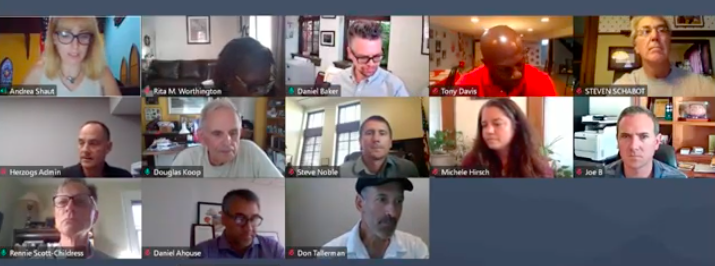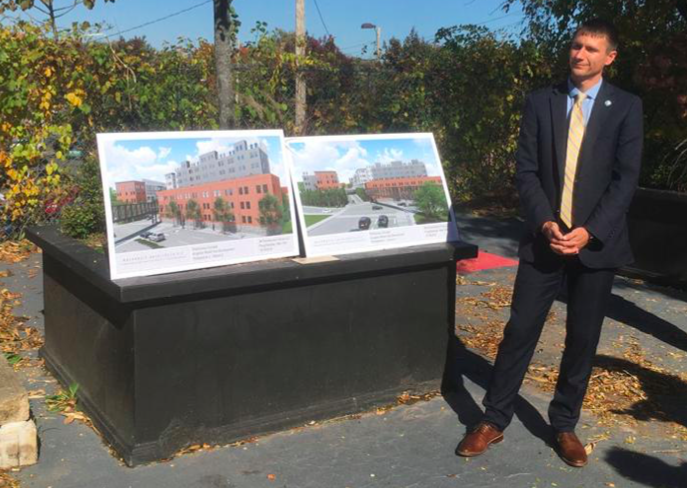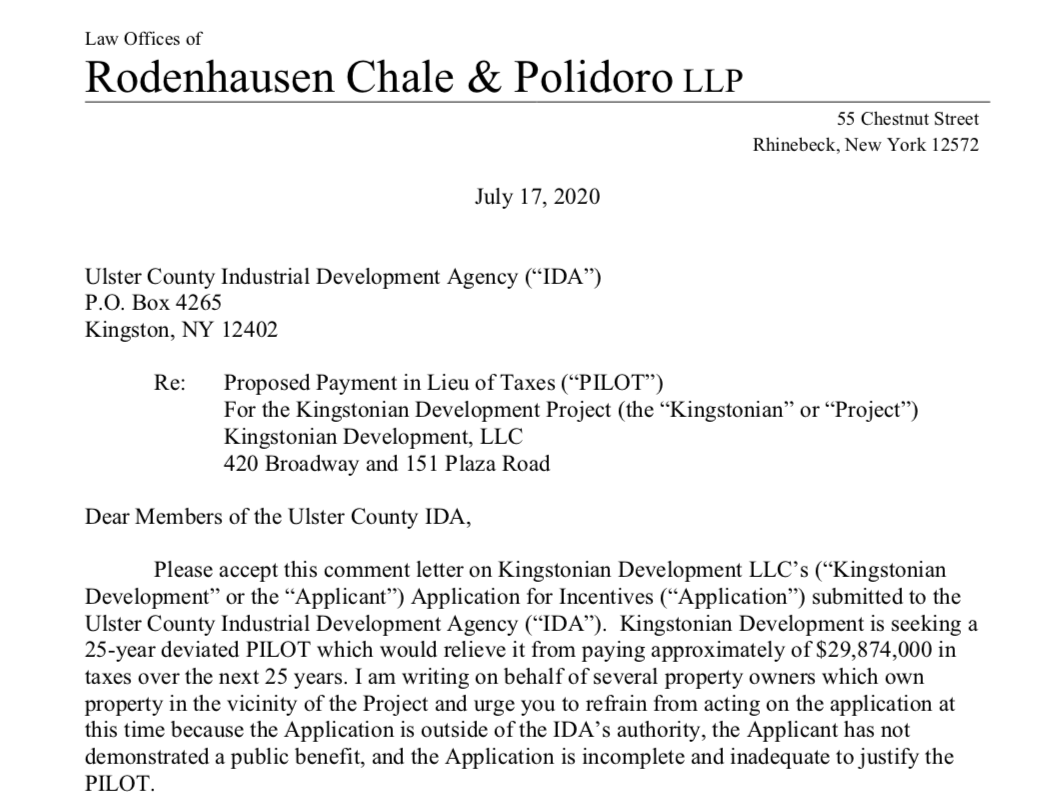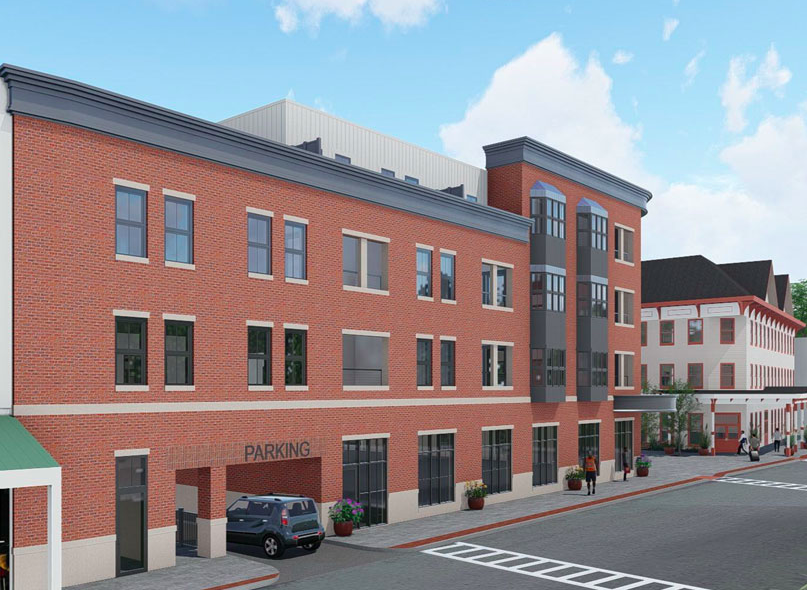By Rebecca Martin
Last night, the Kingstonian deviated PILOT (payment in lieu of taxes) agreement passed through the Kingston Common Council Finance and Audit committee by a 3-1 vote.
Yes: Tony Davis (Ward 6); Rennie Scott-Childress (Ward 3) and Doug Koop (Ward 2).
No: Michelle Hirsch (Ward 9)
Recused: Steve Schabott (Ward 8). A recusal is an automatic ‘no’ vote.
There’s been some chatter about whether or not a recusal (not to be confused with an abstention) equals a “no” vote, and indeed it does. Here’s an example: During the proposed shooting range project vote in 2016, an alderman had to recuse himself because of a conflict resulting in a “no” vote. “James Noble said a recusal by Davis would be recorded as a “no” vote.” The same will be true next week when Alderman Schabot recuses himself from voting on the Kingstonian PILOT.
READ: “Kingston council president will ask Laws and Rules Committee to discuss proposed shooting range”
READ: “Recusal and Abstention from Voting: Guiding Principles”
Thanks to both Alderwoman Hirsch and Council President Shaut for asking the only real substantive questions during the meeting. The Oscar goes to Ward 6 Alderman Tony Davis for his riveting performances.
Although the parking garage is the centerpiece of the PILOT agreement, it succeeded to move through committee even without a clear number and explanation of parking spaces that would be made available to the public (the developer stated that he couldn’t give the parking space variance numbers ‘exactly’ before making an apples / oranges comparison between the Uptown Kingston proposal and a project of theirs in Poughkeepsie).
Next Steps
The Kingstonian PILOT will now go to the Kingston Common Council caucus meeting on Monday, August 3 at 7:00pm where the full council will discuss the PILOT and what happens next. The public can call their council representative and request that during caucus, the PILOT be sent back to committee in order for all of critical questions that have been raised to be answered and put in writing. Without it, we won’t have a clear understanding of what the community is being asked to provide and what we can expect in return.
If the council decides not to send the PILOT back to committee that evening, then it will go on to the floor for a full council vote at the Kingston Common Council meeting on Tuesday, August 4 at 7:30pm.
Counting Votes
TAKE ACTION: We encourage the Kingston community to reach out to the following council members before August 3 to request that the Kingstonian PILOT either be sent back to committee or denied until all of the critical QUESTIONS THAT HAVE BEEN RAISED are not only answered but put in writing so that there is a clear understanding of what the community is being asked to provide and what we can expect to receive in return.
In counting votes, the PILOT has four solid ‘yes’ votes that include: Ward 2 Alderman Doug Koop, Ward 3 Alderman Rennie Scott-Childress, Ward 5 Alderman Don Tallerman and Ward 6 Alderman Tony Davis.
At this time, there is only one publicly known ‘no’ vote for next week’s council meeting: Ward 8 Alderman Steve Schabot (who has recused himself as he works for one of the developers. A recusal is an automatic ‘no’ vote as described above).
The passage or denial of the Kingstonian PILOT agreement therefore hangs in the balance of the following council members:
Ward 1 Alderman Jeffrey Ventura-Morell
ward1@kingston-ny.gov
Ward 4 Alderwoman Rita Worthington
ward4@kingston-ny.gov
Ward 7 Alderman Patrick O’Reilly
ward7@kingston-ny.gov
Ward 9 Alderwoman Michelle Hirsch
ward9@kingston-ny.gov
Other Involved Agencies
As a deviated PILOT, keep in mind that the Kingston City School District Board of Education and the Ulster County Legislature both need to approve the conditions of the Kingstonian PILOT request before the developer can move forward with the UCIDA. The timing of this is anyone’s guess.
What we do know, is that the next Ulster County Industrial Corporation Agency (UCIDA) meeting is scheduled for Wednesday, August 12 at 9:00am.
Outstanding Lawsuits
So far, the Kingston common council, in their discussion about the Kingstonian PILOT, have not referenced the litigation that is pending on the Kingstonian Negative Declaration SEQR decision by the Kingston Planning Board.
However, in a recent letter (submitted on July 17) from the Law Offices of Rodenhausen Chale & Polidoro LLP by Victoria L. Polidoro, who represents several property owners in Uptown, Kingston, the UCIDA was reminded of the following:
The IDA Should Not Consider the Application Until the Pending Article 78 is Resolved
“The IDA should refrain from acting on the application until the pending SEQRA litigation is resolved, as any decision it makes may thereafter be invalidated.“
The IDA is Not Authorized to Grant the Application
“As a threshold matter the IDA does not have authority to consider or grant the Application for the Project which includes residential housing units. The IDA’s Housing Projects Policy, which was reaffirmed on January 8, 2020, only allows IDA financing it limited circumstances. It provides that:
A. The Agency will only consider the granting of any “financial assistance” (asdefined under the Act) for following projects that provide housing:
- A project that satisfies the definition of a continuing care retirement community project under Section 859-b of the Act; or
- A project by an industrial, manufacturing, warehousing, commercial,research and recreation facility (as defined in the Act) that provides workforce housing for its employees.“
Last but not least, the conflicts of interest
On January 8, 2020 in our letter to the Kingston Common Council Laws and Rules committee, we requested that Ward 5 Alderman Don Tallerman recuse himself from any decision-making pertaining to the Kingstonian project. Not only did he appear in a promotional video on the developer’s website (which they have since taken down) he has also delivered public testimony in favor of the zoning change (while opposing the call for affordable housing for the project and supporting the PILOT its parking garage). His testimonies occurred months after he had already declared his candidacy for the council (Daily Freeman 2/20/19: Kingston Democrats Choose Slate of Candidates for November Election). Because he operates an event venue, the Senate Garage, that is directly across from the project site, he stands to significantly benefit directly financially from the development which represents a conflict of interest.








